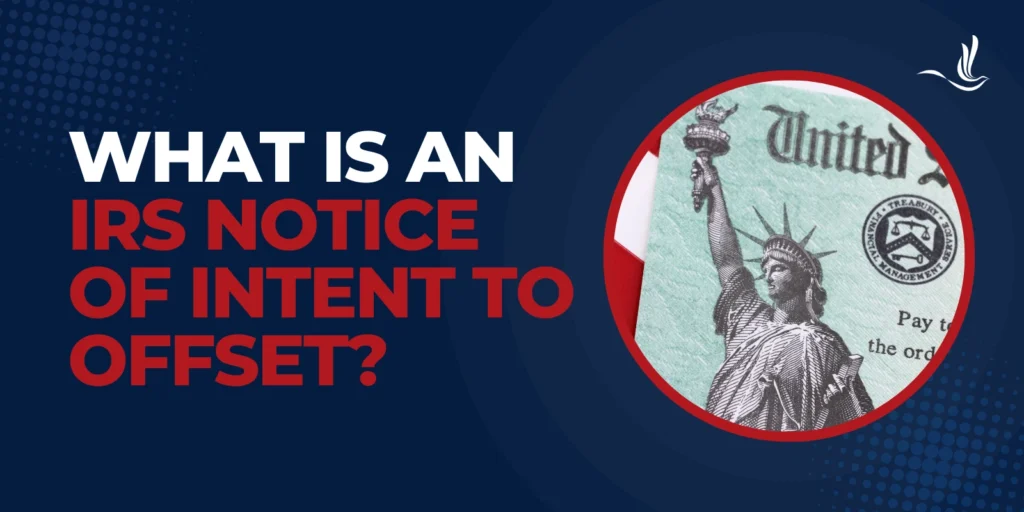
Receiving a notice from the IRS is never pleasant, especially when it involves a Notice of Intent to Offset. This notice signals the IRS’s intention to collect a liability owed to a government agency or entity. They do this by using any federal payments due to you. This might be a concerning situation. However, understanding the process, your rights, and potential courses of action can help alleviate some of the stress associated with it.
What is an IRS Notice of Intent to Offset?
An IRS Notice of Intent to Offset is a formal communication from the IRS informing you of their intention to withhold a portion or the entirety of your federal payments to satisfy a liability you owe to a federal or state agency. The most common form of offset involves tax refunds. However, other federal payments, such as Social Security benefits or federal salary payments, may also be subject to offset.
Common Reasons for Offsetting
Typically, if you have unpaid bills with a government agency for 90 days or more, an offset will be triggered. Here are the most common reasons for an offset:
- Unpaid Taxes: One of the primary reasons for receiving a Notice of Intent to Offset is unpaid federal or state taxes. If you have outstanding tax liabilities, the IRS may use your tax refund to offset the liability.
- Defaulted Federal Student Loans: If you have defaulted on federal student loans, the Department of Education may request an offset to recover the outstanding balance.
- Unpaid Child Support: State child support agencies can request an offset if you owe past-due child support payments.
- Unemployment Overpayments: If you received more unemployment benefits than you were entitled to, federal or state agencies may seek an offset to recover the overpayment. It’s crucial to note that sometimes this occurs by mistake of the government. Even when they calculate your benefits incorrectly, it will be your responsibility to repay what is owed. Be sure to check for accuracy.
Understanding Your Rights
It’s crucial to be aware of your rights when dealing with an IRS Notice of Intent to Offset. Key rights include:
- Right to Notification: The IRS is required to notify you in writing before initiating an offset. The notice will detail the amount owed and the agency to which you owe it. It also informs you of your right to dispute the balance.
- Right to Dispute: If you believe there is an error in the amount or validity of the liability, you have the right to dispute it. You must submit a written request for review within a specified timeframe. You may find yourself in a situation where the offset is due to your spouse’s actions. If this is case, you should look into innocent spouse relief.
- Right to Set up a Payment Plan: In some cases, the IRS may allow you to set up a payment plan to address the balance without offsetting your federal payments.
What to Do If You Receive a Notice
- Review the Notice Carefully: Thoroughly read the Notice of Intent to Offset to understand the specifics of the liability and the proposed offset amount.
- Verify the Liability: Ensure that the balance mentioned in the notice is accurate. If you believe there is an error, gather supporting documentation and prepare to dispute the liability.
- Contact the IRS: If you have questions or concerns, don’t hesitate to contact the IRS. You can find the contact information on the notice.
- Consult a Tax Professional: If dealing with the IRS on your own is unsettling, contact a credible tax professional for assistance.
- Address the Liability: If you owe the balance, consider addressing it promptly to prevent the offset. This may involve setting up a payment plan or negotiating with the relevant agency.
Tax Help for Those Who Receive an IRS Notice of Intent to Offset
Receiving an IRS Notice of Intent to Offset can be distressing, but it’s essential to approach the situation with a clear understanding of your rights and options. Whether you owe taxes, default on student loans, or have outstanding child support payments, taking proactive steps to address the underlying issues can help mitigate the impact of the offset and put you on the path to financial resolution. If you are uncertain about the best course of action, consider seeking advice from a tax professional or financial advisor to navigate the process successfully. Optima Tax Relief is the nation’s leading tax resolution firm with over a decade of experience helping taxpayers with tough tax situations.
If You Need Tax Help, Contact Us Today for a Free Consultation